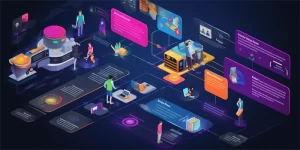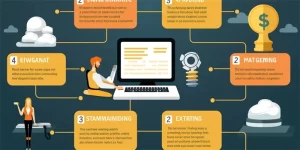Education has always been a crucial aspect of society, shaping individuals and preparing them for future challenges. With the advancements in Artificial Intelligence (AI), a new era of personalized learning experiences has emerged. AI is revolutionizing the education sector by creating tailored learning paths, adaptive assessments, and intelligent tutoring systems. In this article, we will explore how AI is supercharging education and transforming the way we learn.

1. AI-Powered Adaptive Learning
Traditional classroom settings often struggle to meet the needs of all students. AI-powered adaptive learning systems have the capability to customize educational content based on individual strengths, weaknesses, and learning styles. These systems use machine learning algorithms to analyze student performance data and suggest personalized learning paths. Students can learn at their own pace and focus on areas where they need improvement, maximizing their learning potential.
Adaptive learning platforms like Khan Academy and Duolingo have gained popularity by providing personalized learning experiences. They offer interactive exercises, quizzes, and real-time feedback, while continuously adapting to the learner’s progress.
2. Intelligent Tutoring Systems
AI-powered intelligent tutoring systems act as virtual tutors, providing individualized guidance and support to students. These systems are designed to understand the student’s knowledge level, track their progress, and provide targeted feedback. By leveraging AI techniques such as natural language processing and machine learning, intelligent tutoring systems can simulate one-on-one interactions, offering explanations, suggestions, and answering questions.
One example of an intelligent tutoring system is Carnegie Learning’s MATHia platform. It uses AI algorithms to identify areas of difficulty for students and guides them through interactive lessons, practice problems, and assessments, helping them master mathematical concepts effectively.
3. Enhanced Personalized Assessments
Traditional assessments often fail to provide timely and targeted feedback to students. AI-powered assessment tools can overcome these limitations by automatically grading exams, providing immediate feedback, and generating comprehensive performance reports. These tools analyze student responses using AI algorithms, enabling educators to identify knowledge gaps and tailor instruction accordingly.
Platforms like Gradescope and Quizlet offer AI-powered assessment features that help automate grading, streamline feedback, and provide valuable insights into student performance. This allows teachers to spend more time on instruction rather than administrative tasks.
4. Natural Language Processing for Language Learning
AI’s natural language processing capabilities have opened up new possibilities in language learning. Language learning applications, powered by AI, can analyze speech patterns, provide pronunciation feedback, and offer contextual translations. Additionally, AI algorithms can adapt to individual learning curves and provide content that matches the learner’s proficiency level.
Popular language learning applications like Babbel and Rosetta Stone utilize AI techniques to empower learners with personalized language courses, interactive exercises, and simulated conversations, making language acquisition more engaging and efficient.
5. Virtual Reality for Immersive Experiences
AI combined with virtual reality (VR) can take education beyond traditional boundaries by offering immersive experiences. VR simulations enhance learning in various subjects, such as history, science, and art, by providing interactive and realistic environments. AI algorithms can analyze user interactions, track progress, and personalize the virtual learning experience.
Platforms like Nearpod and Google Expeditions leverage AI and VR technologies to create virtual field trips, allowing students to explore distant places, historical events, and scientific phenomena in an engaging and interactive manner.
6. Personalized Content Recommendations
AI can analyze vast amounts of educational content and make personalized recommendations to learners. By analyzing learner preferences, behavior, and performance data, AI algorithms can suggest relevant resources, textbooks, articles, or videos that align with their interests and learning goals.
Platforms like Coursera and Udemy utilize AI to provide learners with personalized recommendations based on their previous course selections, interests, and career aspirations, enhancing the overall learning experience.
7. Data-Driven Decision Making
AI enables educators and institutions to make data-driven decisions by analyzing large volumes of student data. AI algorithms can identify patterns, trends, and correlations in student performance, attendance, and engagement, allowing educators to understand student needs, evaluate instructional strategies, and implement targeted interventions to support struggling students.
Tools like Brightspace and PowerSchool leverage AI analytics to provide educators with actionable insights, facilitating evidence-based decision making and better student outcomes.
8. Ethical Considerations and Impacts
While AI brings significant benefits to education, certain ethical considerations need to be addressed. Data privacy and security should be safeguarded to protect student information. Additionally, AI systems should be designed to avoid biases and ensure equal opportunities for all learners.
Transparency in AI algorithms and decision-making processes is crucial to build trust among educators and students. Ethical guidelines and policies should be established to set boundaries and ensure responsible use of AI in education.
Frequently Asked Questions:
- Q: Can AI completely replace human teachers?
- Q: How can AI personalize education for students with special needs?
- Q: Are there any risks associated with AI-powered education?
A: No, AI cannot replace human teachers. AI technology should be seen as a tool to enhance the learning experience and support teachers in providing personalized education. Human interaction, empathy, and guidance are essential elements that AI cannot replicate.
A: AI-powered adaptive learning systems can cater to students with special needs by analyzing their individual requirements and providing tailored content and interventions. AI can adapt to learning difficulties, provide supplementary materials, and offer personalized support to enhance their educational experience.
A: While AI-powered education offers many advantages, there are some risks to consider. These include potential biases in algorithms, over-reliance on AI without human interaction, and the need for digital literacy skills among students to understand and critically evaluate AI-generated content.
References:
- Johnson, L., Adams Becker, S., Estrada, V., and Freeman, A. (2015). NMC Horizon Report: 2015 Higher Education Edition.
- NUS News. (2018). NUS Computing develops AI system to personalize textbook recommendations for secondary school students.
- Rosé, C. P. (2008). Computational Linguistics and Intelligent Tutoring Systems: Opportunities and Challenges.








